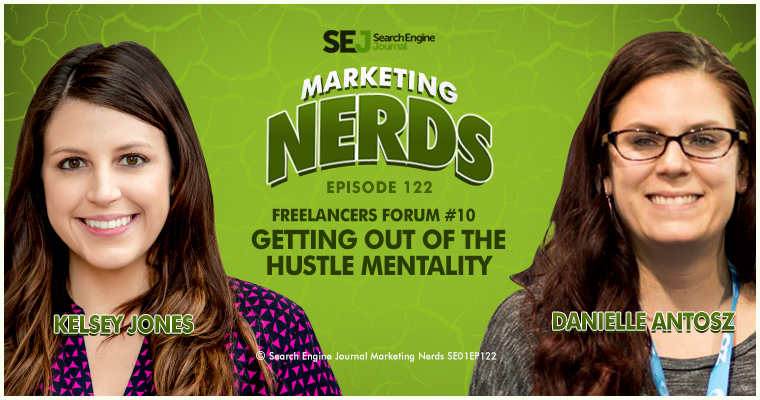Podcast: Download
Subscribe: Apple Podcast Google Podcasts Spotify
Visit our Marketing Nerds archive to listen to other Marketing Nerds podcasts!
Many people think working yourself to the bone should be a badge of honor, especially if you’re a freelancer. SEJ editors Kelsey Jones and Danielle Antosz disagree. In this episode of the Freelancers Forum series, they share their tips for moving from a hustle mentality of fear to one of time management and triumph. They share their experiences in freelancing and how working less can lead to more money and better productivity.

What’s the difference between a hustle mentality and a good work ethic?
Kelsey: There’s a difference between a hustle mentality reflecting on you in a negative way and a good work ethic. A quote I shared with Danielle before we started recording that we think fits the definition of a good work ethic is one by Mark Cuban: “Work like there is someone working 24 hours a day to take it away from you.”
The reason why we used that for motivation is because that goes into work ethic. When you could go an extra 10% or 20% for your clients, or under-promise and over deliver, those are things you want to keep doing no matter how successful you get. When it starts to affect you negatively is when you’re working too much. There’s no work-life balance. You don’t have proper priorities. You’re operating from a place of fear and poor thinking, or poverty thinking, instead of embracing the success you have.
How have your thoughts on hustling changed since you’ve been freelancing?
Danielle: In the beginning, you’re taking just about any client that will come at you, right? You’re hustling. You’re trying to build a portfolio. You’re trying to prove to yourself or maybe even prove to your clients that you’re good at what you do. That you’re able to do well as a freelancer.
I think hustling is important in the beginning. It’s important when you get to the point where you’re shifting from working full-time and freelancing part-time and when you make that shift into full-time freelancing. You do work from a place of fear, a fear of failure. You’re taking clients that maybe have red flags. You feel a little weird about taking the job either because they’re giving you a weird vibe or, ethically, you just don’t feel good about it, or it’s just not something you’re passionate about. It’s very common in the beginning and I think it’s absolutely acceptable in the beginning.
As you get more established as a freelancer, as you get more experience, as you get to the point where you can consider yourself an expert in what you do, there needs to be a shift. At a certain point, you need to step back and think about why you became a freelancer.
For me, it was definitely important to make more money. I make more money freelancing than I did in my corporate job. Also, I have an almost one-year-old, and I like having the balance to spend time with her, spend time with my husband and to travel.
If I’m continuing to work 80 hours a week, that’s not sustainable, and it’s not healthy. That’s what we’re talking about when shifting from the hustle mentality. You do have to hustle always to a certain extent, but it’s also really important to have that work-life balance. That’s the very reason why may people choose to freelance.
Kelsey: Yeah, exactly. I worked so hard almost in the wrong way at the beginning, so hours and hours, 12 to 18 hours a day just to make sure that I was either getting clients, or I was getting work done. I’d have terrible clients that would request really fast turnaround, and I’d say yes because I needed the money.
As you grow up, your thoughts about your business need to grow up, too. I think one major thing we need to talk about is you shouldn’t be bragging about working yourself to the bone. That is not what we were built to do and that should not be your goal at all. I know people who only work 20 hours a week, and they get a lot more done than other people I know that work 40 hours a week. It’s all about being productive. I think that goes into getting out of the hustle mentality, too.
In the beginning, I had no idea how to be productive and block my time. Now, I’m a lot better about it. I know that I do my best work usually around lunch time or early afternoon. That’s when I do my hard work, my writing, my intensive work. All the other admin tasks like email or fixing an Excel spreadsheet, I save those when I’m not as productive. I think that’s what true hustling is as you grow up. It’s figuring out when you’re the most productive and capitalizing on that.
Danielle: Yeah, I agree. There’s two points you mentioned that I think is important to highlight. First of all, you mentioned running a business, and I think that a lot of freelancers don’t think of themselves that way. You are running a business. Would you want to work for someone who worked you that hard? Is it something that you would be happy doing? In general, the answer is no. If that’s happening at the expense of your relationships with people, with your family, I think that’s a huge red flag that you need to step back.
The other thing was working 80 hours a week. There’s a point of diminishing return. There’s a point at which you don’t get any more done. I want to say it’s around 50, 55 hours a week. If you’re working 80 hours a week, your brain stops functioning. You stop being able to focus. Even though you might be working double the hours, you’re not getting double the work done.
What are some actionable steps you took to move from the fear-based hustle mentality to having ownership over what you’re doing?
Danielle: I think the first thing, and I recommend this a lot, is to find ‘anchor clients.’ An anchor client is one or two main clients who you consistently work for every month. These are clients I have long-term relationships with. I know I’m going to get work from them on the regular and I’m not having to just spend a lot of time chasing those clients down.
Build those strong relationships with your clients where they consistently come back to you. Building those relationships makes a huge difference. Having those clients that come to you again and again takes time, but it is doable.
Kelsey: What helped me move from this fear-based thinking to having ownership is really conquering my fear and putting myself in situations that force me out of my comfort zone, even if it wasn’t necessarily related to the hustle mentality. One example is public speaking in front of crowds of people. I flew to Ireland and gave a three-hour presentation on the fly. I barely practiced and they said I did great. I would urge you to think about something that’s terrifying to you and do it because it puts other things in perspective.
Another thing that helped me is this book called Secrets of Six-Figure Women by Barbara Stanny. She said that if you want to raise your rates, double your rate for the next client you get that you’re not personally invested in. Just quote them double the rate that you normally would and see what they say.
When I did after reading that, the client just said, “Okay,” and I was blown away. I’ve done that gradually. Sometimes when I feel I need to raise my rates again, I’ll just say double to the next client I come across and they’ll just say, “Okay.” If it doesn’t work out and if they say, “That’s way out of our budget,” you can always negotiate. It’s always been a conversation. Sometimes it doesn’t end up with them hiring me, but I’ve never had someone just not answer after I give them a quote that’s higher than what I normally charge.
Danielle: Taking ownership of your success is also really important. I think that will help you get out of the hustle mentality, because if you’re good at what you do, people notice, and people will be willing to pay you double what you got paid last time. You should have ownership over your success, and ownership over the fact that you own a business. You’re not just scraping pennies together. Once you get to that point is when it’s really important to move away from the hustle mentality.
Any closing words of wisdom you can impart to our listeners?
Danielle: I do think it goes back to relationships and thinking about what matters in your life. There’s also seasons in life, right? There are seasons where you will be in that hustle mentality, and there is nothing wrong with it. Again, we’re not talking about working hard. We should always work hard. We’re talking about slowing down and thinking about why you became a freelancer and what life you want to build.
Kelsey: I’m going to close out with another Mark Cuban quote. He said, “It’s not in the dreaming, it’s in the doing.” Your career depends on what you’re actually doing, not what you want to do or what you think you should do. It’s all about the actions you’re taking.
Think about that when you’re deciding how you want to design your life, because that’s really what it’s about, designing your life and figuring out what’s important for you, to you, and building your business around that.
To listen to this Marketing Nerds Podcast with Kelsey Jones and Danielle Antosz:
- Listen to the full episode at the top of this post
- Subscribe via iTunes
- Sign up on IFTTT to receive an email whenever the Marketing Nerds podcast RSS feed has a new episode
- Listen on Stitcher, Overcast, or Pocket Casts
Think you have what it takes to be a Marketing Nerd? If so, message Danielle Antosz on Twitter, or email her at danielle [at] searchenginejournal.com.
Visit our Marketing Nerds archive to listen to other Marketing Nerds podcasts!
Image Credits
Featured Image: Paulo Bobita
In-post Image #1: manopjk/DepositPhotos





![AI Overviews: We Reverse-Engineered Them So You Don't Have To [+ What You Need To Do Next]](https://www.searchenginejournal.com/wp-content/uploads/2025/04/sidebar1x-455.png)